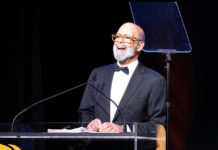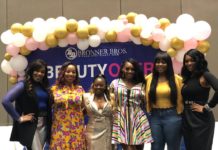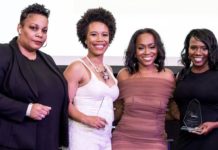Jovian Zayne is a certified leadership and professional development coach. She has over a decade of experience in change management, global diversity leadership development, and organizational transition planning and design. Zayne’s firm, the OnPurpose Movement, is committed to helping organizations and individuals to “live and work on purpose.”
Zayne has been recognized as a thought leader in the professional development and diversity-training field. Her client list includes Google, Goldman Sachs, The New York Times, Columbia University, Harvard University, The Clinton Foundation, The Aspen Institute, Janelle Monáe’s Wondaland Records, and Teach For America.
We were honored that Zayne was gracious enough to give us a moment of her time to share her insight and expertise on purpose, leadership, diversity and much more.
MillBuzz: You are a certified leadership and professional development coach. What did you see that let you know this type of coaching was needed?
Zayne: I got into coaching following my bread crumbs. I talked about bread crumbs all the time as this notion that there are moments in your life crucial moments, significant moments, sometimes seemingly mundane moments, that are truly representative of your innate spirit, that
I began to talk with other people who had formally been coaches, and what I saw were three things that made it clear for me that this work was important. One, there weren’t enough spaces where people had the opportunity to feel like they could have a safe space, to be brave enough to explore their real desires and to explore tough questions that were related back to how they would have a positive impact in the world.
Number two, I recognize coaching was important because a lot of people didn’t have space to get the kind of practical skill development that was necessary for their development in their career. They weren’t having a chance to practice their narratives and to really practice how to tell their story.
Then three, I knew that this work would be important because, frankly, I didn’t see a lot of black women doing this type of work and doing it well. I also recognize that there was a disparity around the access, so not only were there not a lot of black women doing this type of work, but I wasn’t always seeing a lot of people of color coming into the coaching space and being able to take advantage of it. Having people that look like you, so you feel comfortable to step into that kind of space and the financial capital. Not everyone,
MillBuzz: I love your mantra “live life on purpose.” Can you tell us how you use that to help motivate millennials?
Zayne: I do this thing called purpose check. I’ve developed this core four framework to help people consider the why behind the desired impact they want to have in the world. This whole mantra “live on purpose” existed before me. I would say my personal encounter with thinking about purpose through the lens of my everyday work and how I wanted to show up differently. It was part spiritual, for sure, and I was able to translate that into my practical life. A number of years ago, back in 2011, I began experiencing discomfort in how I was showing up in the world. I felt like I wasn’t doing what I needed to do to be purposeful every day. I felt like I was going through the routine, going through habits. I use the mantra now, and it came to me back then, as a reckoning, I was like “Okay, so Jovian, what would you do differently tomorrow if you were being more intentional and purposeful in your action?”
It had me purpose check everything, even what I was putting in my body. Am I doing that purposefully or not? How does that help me to serve a larger purpose? How does that help me to show up and do my best in the world? The conversation I’m having with this person, how purposeful is it? What’s my intention behind our conversation? What am I hoping to get out of it? What I’m hoping to pour into this conversation? I use the mantra “live on purpose,” as a check to ensure that I am showing up in a way that is connected back to a larger why.
My larger why, what I find to be an overarching driver in my life is to show up and to encourage people to be their best.
MillBuzz: In your experience, what seems to be the biggest challenge millennials face as leaders?
Zayne: One thing is what Rick Warren, the author of “Purpose Driven Life,” talks about is what really stops people from being intentional and how they show up more purposeful and being committed to a larger purpose. It’s often because people want to be like someone else. I just want to do what you’re doing. I want to do what the Joneses are doing. Social media has now become the proxy for what people believe they should be doing or what success should look like.
Two, we want to be liked by other people and we prioritize that over a deeper commitment to one’s unique individual call which could set you apart at times in life. I think it’s a real challenge and it impacts the mindset. Our mindset dictates our action, so we have developed the mindset that we have to have everything immediately, you know the microwave economy.
I think a lot of people in my generation— we have a warped sense of success. We let everyone else determine what success is for us like, our social media feeds or what our parents have told. We don’t know how to define success for ourselves. That also creates an unattainable and frankly ridiculous pace at which we think we need to accomplish things. We prioritize speed over a slow or reasonable pace. We also prioritize speed over being still and quiet and listening. When we are letting everything else come in and influence us, that is what we put out. If we’re not sitting with ourselves, if we’re not checking our habits, if we’re not being in tuned with a deeper understanding of who we are, then we’re letting everything else dictate how we show up in the world and that really negatively impact us.
In very specific ways that mean the way I would show up to be a leader, if I only paid attention and I’m only looking at what other people do, I’ll start to think those are my values. If they’re not really the way I believe I’m supposed to show up in the world, then my values and my leadership style isn’t authentic. People can read when things are inauthentic. When we want so many just quick wins, we’re not setting up habits long term. It’s like owning my voice as a leader in the room, owning my vision, owning what I put out in the world. This is a cycle. It’s mindset, it’s habit, but it shows up in our practices, like the way we build our businesses or the way we don’t.
MillBuzz: What are some tips you can give millennials, who are leaders, to help them create a more diverse culture in their workplace?
Zayne: If I were to speak to white leaders who wanted to focus on creating a more diverse culture in their workplace, I think that they need to show up as allies. How they show up as allies at work could vary depending on the context that they’re in, but a lot of time that would look like stepping back and letting people of color step up. It’s ensuring that their voice is not the first voice that’s always heard at every meeting. Think about the distribution of power. Look around a table for decision-making in their office. What are the voices that are missing? Whose voice is not present? How are decisions being made? I would ensure that the people of color in the workplace have the space to create employee resource groups and that they have the budget and support to make changes.
To people of color, I would say similar things. I recognize that the burden on us is disproportionately placed for us to be leading the charge around diversity equity and inclusion in the workplace. I would tell my people of color, don’t go it alone. Work with your sponsors, your mentors, other peers, to do some of the gorilla groundwork to help raise awareness around the gaps and experience between yourselves and your white counterparts. I strategically encourage people of color, especially in corporate workplaces, to read articles from Harvard Business Review, that make it very clear how you can state the business imperative, and business case for your company to care about diversity and conclusion. The data is very clear that heterogeneous teams are outperforming homogeneous teams by 50%.
It’s clear that organizations that are less inclusive and less diverse are losing talent rapidly. It’s important for an organization to develop a comprehensive strategy around diversity, equity, and inclusion.
MillBuzz: Tell us about the International Day of Purpose? Why was it started and how can people participate?
Zayne: International Day of Purpose started back in 2016 and it was born out of my work. At that point, I’d just left my Executive job at Teach for America, where I was leading lots of teams. I had done a lot of recruitment work and coaching for leaders. I just kept noticing how people did not feel connected to a sense of purpose. When they did it would transform the way they showed up in the world. I knew the evidence for myself, but I started to see with lots of other people.
One day I was wondering what would happen if everyone in the world was living on purpose. The question kept nagging me and I kept wanting to tell everybody.
I was having lunch with one of my peer mentors and big sister, Tai Beauchamp, I was telling her how I really wanted to get people to think about purpose. I’d recently been a contributing author to an anthology on leadership and it’s called Lessons in Leadership, I’d written a chapter called “Leading on Purpose.” We celebrated it and everybody at the book launch was really excited and wanted to talk more about purpose and I was like, “oh my goodness we need to do something,” and Tai said, “well when are we going to celebrate it? Is there a holiday?” I didn’t know, so she told me to look it up right then. There was no holiday. Dinner was served and I wasn’t eating because I was on my phone researching and buying domains. Thanks to her encouragement and lighting the fire The Day of Purpose was born.
That question that kept nagging me, every year we’re trying to answer, and we pose it to the world. It’s celebrated annually on the summer solstice which is the longest day of the year. What better day than when you have all this sunshine to be sitting and thinking about how do I show up more purposefully. It’s also in June so it’s like a mid-marker of the year. It gives you a wonderful day to pause and reflect and think about what am I doing to be more purposeful in my life. People celebrate and lots of different ways. I’ve read and seen people write letters to family members that they’ve been holding back from, writing letters of reconciliation. They wanted to restore what was broken. I’ve seen people join us at our International Day of Purpose summit, which is a personal and professional development experience so people can choose different masterclasses and connect with other people who are really celebrating the day. Of course, I’ve seen people celebrate online. We’ve had literally 16 million people become more aware of their purpose through our online campaign, and we work with celebrities, influencers, everyday people like me and you.
This year The Day of Purpose is on June 21st, and people can go to www.dayofpurpose.org and find out all kind of information soon. We are preparing to relaunch and open the site again.
MillBuzz: We’ve seen more women taking over in politics, entertainment, education and other areas. Are there tips or advice you share specifically with women in leadership positions?
Zayne: I think that it’s important for leaders to continually feel comfortable redefining what success looks like for them and establishing what balance or alignment they need to feel whole and valued at work and at home. Women are disproportionally holding the majority of housework and caretaking duties at home. When they are not feeling supported in that it’s showing up at work and vice versa. I really encourage women leaders to take stock of their values, to do a value check every six months. What are the three most meaningful values at that point in time? If you were to make your toughest life decisions, what will be the values that would be the prism through which you would consider your decision? Honor those. Do things that would support those values being true. If right now your family is a number one value and wealth is a number one value, they may compete at times.
I was just working with a number of key women leaders at Google. These are women who are in charge of billions and billions of dollars. One thing coming out of that experience is that many of them were sharing the same pressure of trying to figure out how to do it at home and at work. Having a clear sense of your values would let you communicate those with clarity and passion, and it helps you make tough decisions around what to say no to and what to say yes to.
Lastly, I always say, you can’t be your best self by yourself. I deeply believe that we are all tied together. Building and creating a sense of community with other women leaders, be it a coach or a friend, is important. Back to those Google leaders I was with, one of the biggest reflections that came out of the experience for everybody was realizing they weren’t in this by themselves.
Very specific resources, I think every woman should read Tiffany Dufu’s book “Drop the Ball.” They should all read “Daring Greatly,” by Brene Brown, and “Start with Why” by Simon Sinek.
MillBuzz: Do you have anything else you would like us to add to the article?
Zayne: I’d like to tell people that they can follow me online @jovianzayne.















